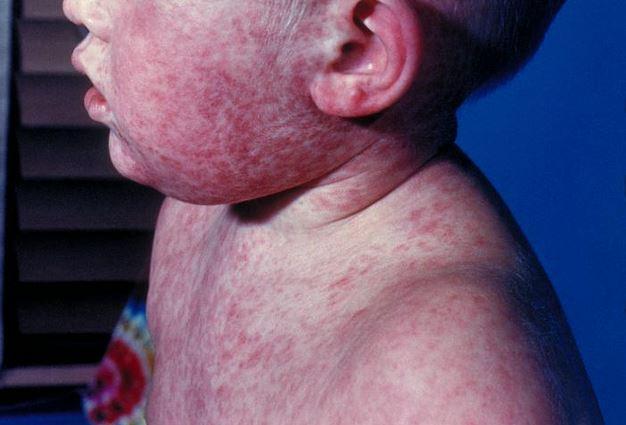Latest Kentucky measles case confirmed in Jefferson County; health officials say vaccination is best protection

By Melissa Patrick
Kentucky Health News
Another case of measles has been confirmed in Kentucky, bringing the state’s total number of cases this year to 13.
The most recent case is in Jefferson County in a child “who recently traveled internationally to an area with ongoing measles transmissions,” according to Louisville’s health department.
“It’s unknown if the child was vaccinated against measles, said Connie Mendel, Louisville’s chief health strategist,” Kentucky Lantern reports. Eleven of the state’s other 12 cases are in people unvaccinated against measles, and the 12th is in a person who got only one of the recommended two-dose vaccine.
Kentucky’s 13 cases add to the largest outbreak of measles in the U.S. since measles was declared eliminated in the country in 2000. Nationally, the Centers for Disease Control and Prevention reports 1,309 confirmed cases in 2025.

Dr. Nicholas Van Sickels, an infectious disease specialist with UK HealthCare, said vaccination is the best way to protect yourself and others from measles.
“If you look at measles outbreaks in general, overwhelmingly, you see that people who are unvaccinated are disproportionately affected because it is just so, so, so contagious,” he said. “On average, if you have an unvaccinated population, one person can infect 12 to 18 more, and then it just expands.”
Measles is a highly contagious respiratory virus that can cause serious health complications, especially in young children. It spreads through the air when an infected person coughs or sneezes and can survive for up to two hours after an infected person leaves an area.
Symptoms of measles include fever, cough, congestion, runny nose and red, watery eyes. Several days after the start of symptoms, a rash occurs. It usually starts on the head and spreads down the body.
The two-dose MMR vaccine is recommended for children at 12 to 15 months old, with a second dose between ages 4 and 6. Two doses of the MMR vaccine are 97% effective against measles, and one dose is estimated to be about 93% effective.
Further, Van Sickels said, the vaccine offers some protection to people who get measles even though they’ve been vaccinated, noting that they will likely have a milder illness and are less likely to spread the disease to other people, including those who can’t get vaccinated.
Herd immunity
People who can’t get vaccinated against the measles depend on those who can get vaccinated to protect them from the disease through herd immunity.
“If you have a ton of herd immunity, if you have over 95% of the population protected through vaccination, measles has a tough time taking hold,” Van Sickels said. “Because even if a couple of people get infected, they don’t spread it very well, and the people they try to spread it to are blocking them in most cases because of vaccination.”
This is important, he said, because while most people do recover from measles, “a significant number of people who get complications, such as ear infections, pneumonia, require hospitalization.” And though rare, he said some will die from it, get encephalitis or will have neurologic problems years later.
“And so these are really rare events, but to me, why would you take that chance when those rare events are counterbalanced by a very effective and safe vaccine that has an excellent safety profile?” he said.
Among those who cannot get vaccinated are pregnant women, people who are moderately or severely immunocompromised, people who have had a recent organ transplant, and those who are undergoing chemotherapy or have had a bone marrow or stem cell transplant. Further, most children under 12 months of age are not vaccinated.
Van Sickels added that people with HIV (human immunodeficiency virus) should ask their health care provider if they can get the measles vaccine, as this varies from person to person.
Tips for people who can’t get vaccinated
Van Sickels said there is a low chance for an unvaccinated person to get measles if they are just out and about town, but if they are spending time in crowded places, traveling on planes or public transportation, or traveling outside the country, they need to protect themselves with basic public health measures.
“If you can wear a simple surgical mask that is protective. Wash your hands regularly. Try to go and be in open-air spaces as much as you can,” he said. “Those are the tools you have if you’re traveling internationally and you have a child that’s less than 12 months old.”
He also noted that children as young as 6 months are eligible to receive the vaccine if traveling internationally.
In late May, the CDC urged Americans to be fully vaccinated against measles at least two weeks before they travel internationally. It also urged people who are not able to get vaccinated to talk to their clinician before traveling and to consider postponing their trip.
What to do if exposed
Van Sickels said it is important for people who have been exposed to the measles, especially if they are not vaccinated, to call their health care provider and their local public health department.
“Kentucky’s health department has been wonderful with this, in this outbreak. . . . They do that very intensive work of contact tracing, which is tough, and then they will actually help facilitate access to exposure treatment,” he said.
Contact tracing involves finding where the infected person was initially exposed and then making sure all of the people that have since been exposed by the infected person are identified and notified.
Vaccine hesitancy
The resurgence of measles can be attributed, in part, to declining vaccination rates.
In Kentucky, coverage among kindergartners for the measles, mumps and rubella (MMR) vaccine for the 2024-2025 school year dropped to 86.9%, which is lower than the national average of 93%. In 2023-2024, that rate was 90% in Kentucky.
Van Sickels said to help people who are vaccine hesitant, he stresses that we have 50-plus years of data on this vaccine about how safe and “overwhelmingly effective” it is.
He also points to the importance of what he called “herd protection.”
“Maybe there’s a child who can’t get it because they have leukemia,” he said. “You getting vaccinated helps that person.”